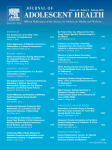Abstract:
Purpose: Although child poverty is recognized as a critical determinant of poor educational achievement in the United States, policy discussions on raising academic achievement rarely include the importance of the effects of poverty on the mental health of adolescents. This article examines the role of adolescent emotional well-being (indicators of depression) as a mediator of the effects of poverty on differences in educational achievement at the national and U.S. state levels.
Methods: Differences in standardized adolescent academic achievement across 23 developed countries and 39 U.S. states were analyzed using path analytic techniques to test the hypothesis that indicators of adolescent emotional well-being mediate relations between child poverty rates and academic achievement.
Results: Child poverty rates were related to both adolescent emotional well-being and educational achievement across both U.S. states and developed countries. Path analyses showed that the status of a country’s or state’s adolescent emotional well-being is a strong predictor of its educational achievement and that emotional well-being mediates the relationship between poverty and educational achievement.
Conclusion: Policies designed to ameliorate the adverse effects of poverty on mental health are critical as they are likely to improve both average educational achievement and student emotional well-being. Attention to improving mental health care not only has the potential to reduce societal and individual costs directly related to health but also to reduce the indirect costs of poor educational achievement.
Authors
- Liza Riesel
- Daniel Romer
- Sharon R. Sznitman


